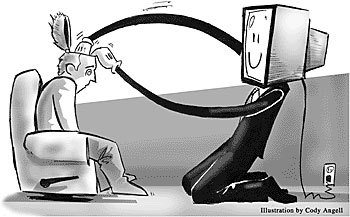
Illustration by Cody Angell
|
By Daniel Cucher
Arizona Daily Wildcat
Tuesday October 8, 2002
Attention all Wildcat readers! How would you like to be part of the first-annual Intergalactic Television Turn-off Week 3000? You know you would. Hey, pay attention and stop glancing over at that TV!
How much television do you watch a day? No, seriously. Don't underestimate, and make sure to count commercial breaks ÷ even if you mute the TV and work on a crossword puzzle or go looking for a snack. Whip out the television listings and add up every show you watch.
Now add every hour you spend playing TV game consoles.
Now add every hour you spend watching videos.
Now add every hour you spend trying to figure out what to watch.
If you hit the four-hours-a-day mark, you're just about average. Fine, you say, so watching four hours of TV a day is OK, because it's no more or less than most Americans. But here's the problem: Most Americans are relatively brain damaged.
Let's pause a moment to define the term "brain damaged." This isn't to say that most couch potato Americans have lost their ability to breathe, consume food and defecate in the appropriate apparatus. Quite to the contrary; this country boasts a population that exceeds at eating and pooping. We're the world leaders!
By "brain damaged," we refer to an individual's significantly diminished ability to think.
Let's pause again, this time, to define "think." Better yet, let's define what thinking is not.
Listening to a news commentator spit out some words about world affairs, then turning around and spitting them at someone else is not thinking. It's regurgitating.
Answering a question in the form of a question before other contestants can answer is also not thinking. It's boasting.
Commanding an army of digital hockey players against an artificially intelligent opponent is an impressive monkey trick, but it's not thinking.
Thinking requires a higher level of brain activity that most television is programmed to disable. If TV made people think, it would require more effort than most people are willing to exert in their leisure time. TV programming is designed to switch off that part of the brain and make people relax into a semi-comatose state of visual and aural consumption.
TV tricks people by making them think that they're thinking. But people who think they're thinking when they're not thinking are brain damaged.
For example, let's say Jim wants to hit on Gail. He needs something to say, so his brain systematically sorts through every "Beverly Hills 90210" episode until he finds his inner Dylan McKay and generates a line.
Jim smoothes down his sideburns, walks up to Gail, and says that he's a recovering heroin addict who likes to crash motorcycles. Gail finds this exciting and mysterious, gives him the international signal for "that's hot," and the two shag happily every after.
Through years spent observing people who look and talk like him on TV, Jim has been programmed to act a certain way. His natural human tendency for mimicry allows TV to serve as a billboard for what Jim considers social norms. Fortunately for him, Gail has been subject to the same influences, and is easy game for Jim's mindless advances. They both think they're witty and unique, when, in fact, they're just imitating what they saw.
We all know that TV is not around to either inform or entertain us. Occasionally it's entertaining,
and every three leap years or so, TV can be informative. But the main purpose of TV is to sell us stuff.
So when we sit around and absorb television's flashing lights and noises, we receive two things: advertisements and a gooey lubrication that TV programmers smear all over us to make us more receptive to the ads. We can usually identify the ads. But the lubrication is a stealthy toxic slime that damages our brains.
Prolonged exposure to this substance dulls our ability to be visually stimulated and renders us numb to the beautiful subtleties of our world. It usurps our precious identities for simpler, more accessible ones. It thinks for us to disable our thinking mechanisms and make us compliant little drones.
Television is the single strongest channel for mass brainwashing. Fight back, starting the week of Oct. 14 (that's next Monday).
For at least one week, unplug your TV, cover the reflective screen with a poster and find another way to spend four hours a day.
On Oct. 14, free yourself from the world's most popular source of brain damage.
Then, write in and tell us how it enriched your week.

